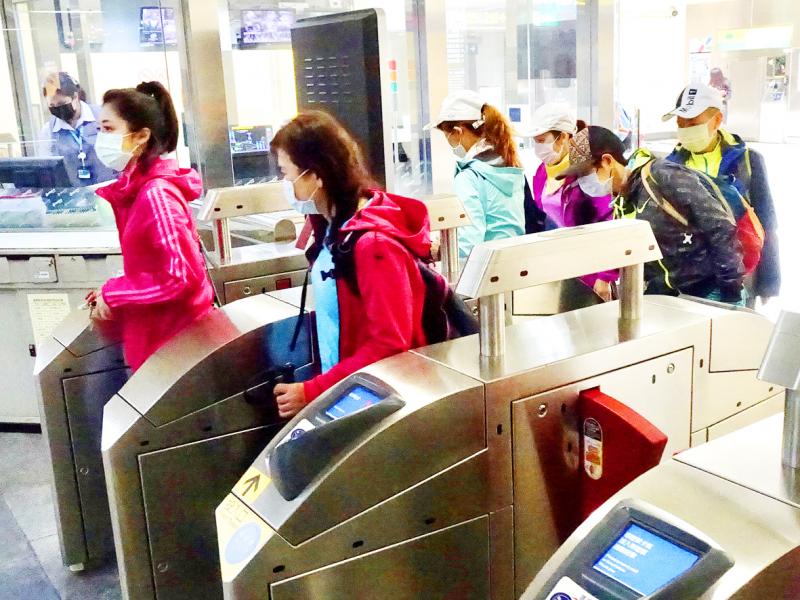People who refuse to wear a mask on public transportation after being asked to do so would face a NT$3,000 to NT$15,000 fine, effective immediately, the Central Epidemic Command Center (CECC) said yesterday after announcing nine additional COVID-19 cases.
In a move to curtail the spread of the novel coronavirus, the Ministry of Transportation and Communications on Tuesday announced that people must wear masks on trains and intercity buses, while Minister of Health and Welfare Chen Shih-chung (陳時中), who heads the center, on Tuesday said that people should wear them when they cannot maintain a social distance of 1.5m indoors.
Chen yesterday added that the government would fine those who do not wear masks on public transportation after being asked to, citing the Communicable Disease Control Act (傳染病防治法).

Photo: Tu Chien-jung, Taipei Times
Service personnel at Taiwan Railways Administration and High-Speed Rail stations from Tuesday have been directing people to convenience stores to buy masks if they do not have one, said Deputy Minister of the Interior Chen Tsung-yen (陳宗彥), who is also deputy head of the center.
Fines on local buses and MRT systems would be handled by local governments, while those on nationwide systems would be managed by the transportation ministry, Chen Tsung-yen said.
The center would ask the transportation ministry to negotiate with local governments over which party is to be responsible for fines issued on buses that operate across municipalities, he said.
Later yesterday, the Taipei City Government said in a news release that it would follow the center’s instruction to implement the policy immediately.
Meanwhile, the CECC yesterday reported nine additional cases of COVID-19 — seven imported and two locally transmitted — bringing the nation’s total to 348.
The imported cases, five women and two men, are all Taiwanese who had traveled to Austria, the Czech Republic, Denmark, Thailand, the UK or the US before returning to Taiwan between March 14 and Wednesday, CECC data showed.
One of the two locally transmitted cases was No. 343, a woman in her 60s who developed symptoms on March 20 after her husband on March 17 returned from the US, Chen Shih-chung said.
The CECC would test her husband for the virus to clarify the transmission path, he said.
Case No. 347 is a woman in her 40s who had contact with case No. 336, a female security guard for an apartment complex in northern Taiwan whose case was reported on Thursday, the data showed.
The security guard transmitted the virus to the woman, a resident in the complex, possibly because the two had chatted without wearing masks, Chen Shih-chung said.
It might not be necessary to reveal the location of the residential complex, as the CECC has all the footage from its surveillance cameras, which helped clarify the guard’s contact history, he added.

People can preregister to receive their NT$10,000 (US$325) cash distributed from the central government on Nov. 5 after President William Lai (賴清德) yesterday signed the Special Budget for Strengthening Economic, Social and National Security Resilience, the Executive Yuan told a news conference last night. The special budget, passed by the Legislative Yuan on Friday last week with a cash handout budget of NT$236 billion, was officially submitted to the Executive Yuan and the Presidential Office yesterday afternoon. People can register through the official Web site at https://10000.gov.tw to have the funds deposited into their bank accounts, withdraw the funds at automated teller

PEACE AND STABILITY: Maintaining the cross-strait ‘status quo’ has long been the government’s position, the Ministry of Foreign Affairs said Taiwan is committed to maintaining the cross-strait “status quo” and seeks no escalation of tensions, the Ministry of Foreign Affairs (MOFA) said yesterday, rebutting a Time magazine opinion piece that described President William Lai (賴清德) as a “reckless leader.” The article, titled “The US Must Beware of Taiwan’s Reckless Leader,” was written by Lyle Goldstein, director of the Asia Program at the Washington-based Defense Priorities think tank. Goldstein wrote that Taiwan is “the world’s most dangerous flashpoint” amid ongoing conflicts in the Middle East and Russia’s invasion of Ukraine. He said that the situation in the Taiwan Strait has become less stable

FRESH LOOK: A committee would gather expert and public input on the themes and visual motifs that would appear on the notes, the central bank governor said The central bank has launched a comprehensive redesign of New Taiwan dollar banknotes to enhance anti-counterfeiting measures, improve accessibility and align the bills with global sustainability standards, Governor Yang Chin-long (楊金龍) told a meeting of the legislature’s Finance Committee yesterday. The overhaul would affect all five denominations — NT$100, NT$200, NT$500, NT$1,000 and NT$2,000 notes — but not coins, Yang said. It would be the first major update to the banknotes in 24 years, as the current series, introduced in 2001, has remained in circulation amid rapid advances in printing technology and security standards. “Updating the notes is essential to safeguard the integrity

REASSURANCE: The US said Taiwan’s interests would not be harmed during the talk and that it remains steadfast in its support for the nation, the foreign minister said US President Donald Trump on Friday said he would bring up Taiwan with Chinese President Xi Jinping (習近平) during a meeting on the sidelines of the APEC Summit in South Korea this week. “I will be talking about Taiwan [with Xi],” Trump told reporters before he departed for his trip to Asia, adding that he had “a lot of respect for Taiwan.” “We have a lot to talk about with President Xi, and he has a lot to talk about with us. I think we’ll have a good meeting,” Trump said. Taiwan has long been a contentious issue between the US and China.